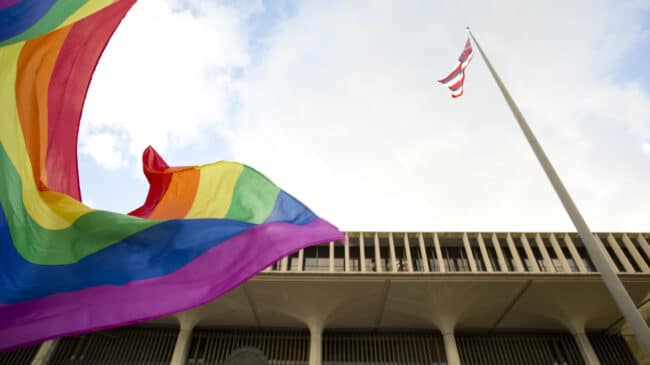Summary
Currently, Article I, Section 23 of Hawaii’s Constitution states: “The legislature shall have the power to reserve marriage to opposite-sex couples.” The Hawaii Remove Legislature Authority to Limit Marriage to Opposite-Sex Couples Amendment was put on this year’s ballot by the state legislature so voters can choose to remove the current language in Section 23 or to leave it as-is.
Fiscal Impact
Hawaii legalized same-sex marriage licenses in 2013, and same-sex marriage was legalized across the United States in 2015 with the Obergefell v. Hodges decision. There is therefore no fiscal impact.
Proponents’ arguments
The Democratic Party of Hawaii supports the amendment. Democratic Governor Josh Green gave written testimony to the House Committee on Judiciary & Hawaiian Affairs in favor of the measure, noting that Hawaii’s Supreme Court over 30 years ago maintained that limiting marriage to heterosexual couples was discriminatory and that in 2013, the Hawaii Marriage Equality Act recognized same-sex marriages. U.S. House Representative Jill Tokuda (D-2nd) offered written testimony arguing that the Supreme Court’s threat to revisit the Obergefell decision demands action to preserve the rights of LGBTQ Hawaiians.
Among the nongovernmental supporters of the amendment’s passage are the Hawaii Civil Rights Commission, the American Civil Liberties Union of Hawaii, the Hawaii Health & Harm Reduction Center, and the Hawaii State AFL-CIO. The Hawaii State AFL-CIO, in its testimony to the House Judiciary & Hawaiian Affairs, wrote, “As a labor organization, we understand the importance of fighting for the rights of marginalized communities,” rooting their endorsement in the need for equal treatment under the law, fairness, and non-discrimination.
The ACLU, in its written testimony to the House Committee on Judiciary & Hawaiian Affairs, noted that it had opposed the original constitutional amendment, which would become Section 23, on the grounds that it was discriminatory. It believes that because the language is discriminatory, it should be removed. The ACLU also emphasized the importance of doing so due to the Supreme Court’s “roll back of abortion and civil rights protections, and dicta suggesting the potential over-turning of Obergefell vs. Hodges.”
Opponents’ arguments
The bill introducing the constitutional amendment, Hawaii House Bill 2802, was not passed unanimously, although there was bipartisan support. It passed in the House 43-6, with one Democrat and five Republicans voting against it. The Senate voted 24-1 in favor, with one Republican voting against it. Those who opposed the bill did not give written statements to the House Committee on Judiciary & Hawaiian Affairs.
No political, nongovernmental, or religious organizations are taking formal positions opposing the amendment. One of the chief political proponents of the 1998 constitutional amendment to grant the legislature the ability to reserve marriage to heterosexual couples, State Senator Mike Gabbard (D-Kapolei), apologized this year for his role in that amendment and voted to repeal it.
Discussion
Hawaii’s Amendment 2, which would become Section 23, in 1998 was approved by 70% voters to establish in the state constitution that only members of the opposite sex could legally marry in Hawaii. The right for same-sex couples to marry in the state was nevertheless legislatively granted in 2013 with the state Marriage Equality Act. The ability for states to prohibit marriage for same-sex couples was later further invalidated by the Supreme Court’s 2015 Obergefell v. Hodges decision, which ruled that marriage was a right guaranteed to same-sex couples under due process and equal protection. However, Section 23 remains in the state constitution.
This amendment removes vestigial and now dormant language from the Hawaii constitution that enabled the legislature to limit marriage on the basis of sex. Hawaii was one of 30 states that amended its constitution via ballot initiative to include language that limited, or potentially limited, marriage to unions between a man and a woman between 1998 and 2012. To date, only Nevadans have repealed their amendment. There is no other practical change, fiscal or social, that will come from voters’ approving this amendment. Both judicially via Obergefell v. Hodges (2015) and legislatively via Hawaii’s Marriage Equality Act (2013), and the Respect for Marriage Act (2022), same-sex couples in Hawaii are entitled to marry and have their marriage recognized across all 50 states.
It is still appropriate for Section 23 to be democratically removed by the voters of Hawaii, for several reasons. This language has been deemed unconstitutional, because it violates core principles of personal freedom and equality under the law. Removing it ensures that the government is limited in its ability to legislate morality and restrict access to a socially validated institution that also provides numerable tangible and intangible benefits. And, societal attitudes have changed dramatically since Section 23’s passage. Seventy percent of Hawaiians now support the right for same-sex couples to legally wed, and so it is likely to pass, along with similar ballot measures in Colorado and California.
